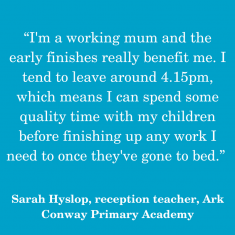This article first featured in Teach - our monthly best practice newsletter featuring tips and practical advice from Ark, our partners and our friends.
Sign up for Teach now to receive teaching tips direct to your inbox.
 Last month, Ark Conway Primary Academy in Hammersmith was awarded Gold in Mind’s Workplace Wellbeing Index, which recognises excellence in commitment to staff wellbeing.
Last month, Ark Conway Primary Academy in Hammersmith was awarded Gold in Mind’s Workplace Wellbeing Index, which recognises excellence in commitment to staff wellbeing.
Lois Osborne, Head of School, shares her top tips for promoting wellbeing in your school. Ark Conway’s approach to promoting mental health and wellbeing to its staff of around 30 people is based on the New Economics Foundation’s 'Five Ways to Wellbeing'.
1. Be flexible - It's about 100% awareness of the wellbeing programme, not 100% participation. Not everyone will want to take advantage of what's available, but knowing that it's there if needed is just as important.
2. Be active - We gave every member of staff a fitness tracker to wear at school. Studies have shown that wearable technology can boost both productivity and job satisfaction. We wanted our staff to be aware of how important it is to take care of themselves and stay healthy. Some people have become fairly competitive with their step count though!
 3. Connect with family and friends - We have dedicated self-directed time from 4pm every day. This is based on the concept of self-directed education, which promotes being in charge of your own time. It's not enforced, as we know some of our teachers like to stay at school to finish up, but we appreciate our staff have other commitments, whether that be families, hobbies or catching up with friends.
3. Connect with family and friends - We have dedicated self-directed time from 4pm every day. This is based on the concept of self-directed education, which promotes being in charge of your own time. It's not enforced, as we know some of our teachers like to stay at school to finish up, but we appreciate our staff have other commitments, whether that be families, hobbies or catching up with friends.
4. Be open-minded - There's a culture of openness at the school. All SLT members have an open-door policy and staff know they can discuss anything with them. There's also no judgement at our school. Staff aren't criticised for not staying late - in fact I like to lead by example and will often leave early myself.
5. Offer little luxuries - Little things go a long way, so we try to provide our staff with a few extras to brighten their day. Things like fresh fruit in the staff room and a professional library, so that if there's a new book they want to read, it can be accessed without having to pay.
6. Keep learning - According to the NHS, continuous learning helps you to feel more optimistic and get the most out of life. We're promoting Learn Bites - our teachers are given three half days every year that they can dedicate to learning something new. That might be mastering a language, playing an instrument or trying out the latest teaching technique. Doing something new helps to build confidence, as well as being fun!
7. Have standing meetings - Replace your long, drawn-out morning meetings with purposeful, directive standing meetings. We have ours at 8.15am for about five minutes before school starts at 8.20am. They are to-the-point and so we still manage to cover everything that needs to be discussed. 
8. Take notice - We encourage mindfulness throughout the school. We invited Mind in to run a "lunch and learn" session with our staff and discuss the practice. We're keen to run more of these sessions with an array of engaging speakers.
9. Offer support - We work with Workplace Options, an employee assistance programme, which is available across the Ark network. It's a free and confidential service which provides information, resources and counselling on any of the challenges that life may bring. Our staff might not need it, but knowing it's there is so important - it can be hard to know where to turn.
10. Get your students involved - We've introduced brain breaks (a deep breathing mindfulness technique) in our classes - even in our reception class! We do these three times a day and it allows pupils to clear their minds. We also teach our pupils about the science of the brain, so they'll understand why they're doing it. It helps make them more aware of their own wellbeing and ensure they can look after themselves later in life.

